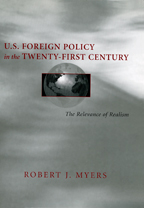
170 pages / 6.00 x 9.00 inches / None
Political Science & Political History
In U.S. Foreign Policy in the Twenty-First Century, Robert J. Myers gives coherent statement to a complex history of political theory involving idealism and its theoretical counterpart, realism. He restates the possible outcomes of the tension between idealist and realist expectations “so that there may be a broader consensus on what one can both expect and accept about how the political world works in both normal times and times of crisis.”
Adherents of realism like Myers claim that a political philosophy based on the key considerations of interest, power, and moral purpose will create order from the seemingly chaotic nature of international relations. This approach, known as political realism, calls for the intervention of a statesman-philosopher with a profound understanding of international political operations.
Early chapters—on the legacy of the Peloponnesian War, on China’s international relations system, and on historicism and progress—lay the historical groundwork for understanding the premises of political realism. Chapters on the “just war,” isolationism as a misapplication of international organization, environmental issues, and human rights follow, with a concluding chapter on what Myers calls the promise of realism for the United States in the next millennium.
As Myers demonstrates, only through the study of the ideas of ancient and modern political philosophers can one see the enduring outlines of good statecraft, based on the principles of political realism. The wise leaders of the future will follow the soundest principles of the past, taking the United States and the world confidently into the twenty-first century.
Found an Error? Tell us about it.